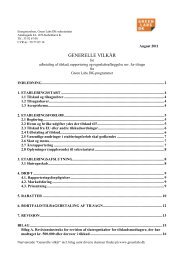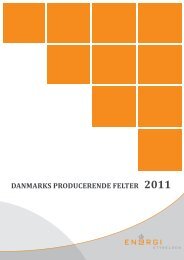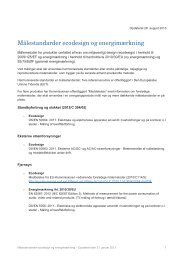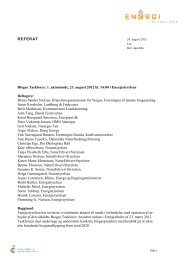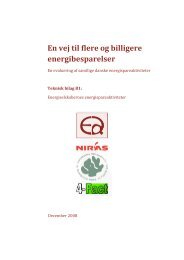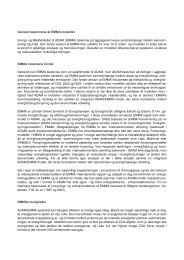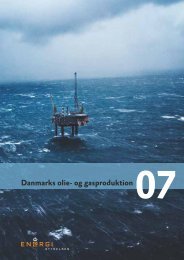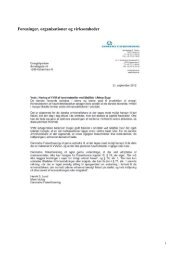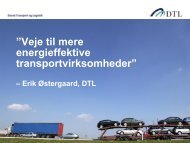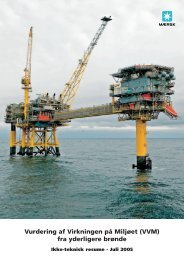Energy Strategy 2050 – from coal, oil and gas
Energy Strategy 2050 – from coal, oil and gas
Energy Strategy 2050 – from coal, oil and gas
Create successful ePaper yourself
Turn your PDF publications into a flip-book with our unique Google optimized e-Paper software.
The transition to fossil fuel independence will not be free.<br />
It will cost money to convert to more energy efficient<br />
technology <strong>and</strong> renewable energy. It will require investment<br />
which in the long term will mean lower fuel costs,<br />
but which in the short term will often be more expensive<br />
than the fossil alternatives. In the longer term, transition<br />
will result in an economy less vulnerable to fluctuating<br />
energy prices, <strong>and</strong> Denmark will make its contribution to<br />
meeting the costs arising <strong>from</strong> extensive global climate<br />
change. If these benefits are taken into consideration,<br />
the extra costs of the transition to a society without fossil<br />
fuels will overall be modest, although transition will have<br />
to be gradual <strong>and</strong> over a long time period.<br />
An economically responsible transition is important for<br />
the Danish government. Therefore all the new initiatives<br />
in the government’s strategy are fully financed. Furthermore<br />
the financing has been designed with full respect<br />
for existing economic policies <strong>and</strong> in a way, which retains<br />
the overall competitiveness <strong>and</strong> employment of Danish<br />
companies, <strong>and</strong> which provides new opportunities for<br />
green growth.<br />
The transition to fossil fuel independence<br />
will not be free.<br />
In line with the phasing out of fossil fuels, government<br />
revenues <strong>from</strong> taxes on fossil fuels will naturally fall as<br />
well. This means that the government’s revenue base will<br />
deteriorate with an unchanged tax system. This in turn<br />
means that there will be a need to gradually introduce<br />
taxes on other energy sources to ensure government<br />
revenues, <strong>and</strong> thus the basis for continued welfare.<br />
Together with continued taxes on fossil fuels, transition<br />
can be financed while also ensuring the right incentives<br />
to reduce the use of fossil fuels.<br />
In any case, changes in the existing tax system will have<br />
to take full account of the competitiveness of Danish<br />
businesses <strong>and</strong> the finances of individual households.<br />
There is no benefit in conducting energy <strong>and</strong> climate<br />
policy at the cost of Danish businesses <strong>and</strong> Danish jobs.<br />
However, neither is it possible to exempt the business<br />
community entirely <strong>from</strong> the burden of transition to fossil<br />
fuel independence. The government’s strategy has<br />
established a balance between competitiveness <strong>and</strong> the<br />
need for a fair distribution of the burden of transition.<br />
<strong>Energy</strong> <strong>Strategy</strong> <strong>2050</strong> <strong>–</strong> <strong>from</strong> <strong>coal</strong>, <strong>oil</strong> <strong>and</strong> <strong>gas</strong> to green energy.<br />
57



